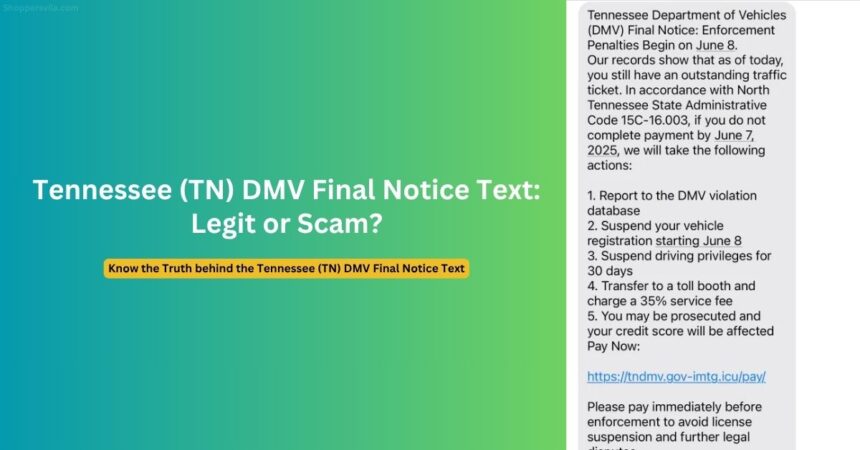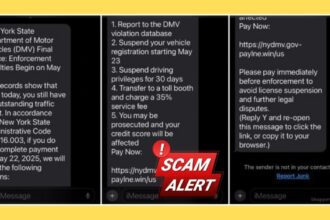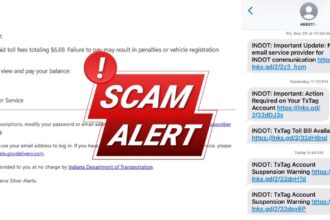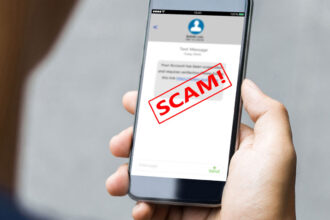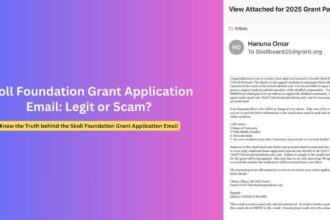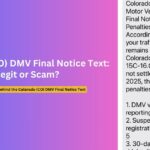Breaking Alert: A sophisticated Tennessee (TN) DMV Final Notice Text Scam is rapidly spreading throughout the Volunteer State, targeting unsuspecting residents with fraudulent messages claiming to be from the “Tennessee (TN) State Department of Motor Vehicles.” These deceptive texts threaten immediate license suspension for alleged unpaid traffic tickets and direct victims to malicious websites designed to steal personal and financial information.
The Tennessee Department of Safety and Homeland Security and state law enforcement agencies are issuing urgent warnings as this coordinated phishing campaign affects thousands of Tennessee residents across all counties. These professional-appearing messages exploit people’s fear of government penalties and create artificial urgency to pressure victims into clicking dangerous links and providing sensitive information to cybercriminals operating from international locations.
Overview of the Tennessee (TN) DMV Outstanding Traffic Tickets Text Scam
The Tennessee (TN) State Department of Motor Vehicles Outstanding Traffic Ticket Text scam represents a highly sophisticated “smishing” (SMS phishing) operation specifically targeting Tennessee residents through fake government communications. Cybercriminals are mass-distributing fraudulent text messages that falsely claim to be from Tennessee’s motor vehicle department, creating panic about supposed unpaid traffic violations that could result in immediate license suspension and severe legal consequences.
This coordinated fraud campaign is particularly dangerous because it mimics official government communications while using urgent language, fake legal references, and threats of devastating penalties to establish credibility and force immediate action. The messages reference non-existent Tennessee administrative codes and threaten severe consequences including license revocation, vehicle registration cancellation, credit score damage, and criminal prosecution—all designed to pressure victims into clicking malicious links without taking time for proper verification.
The Tennessee Department of Safety and Homeland Security has confirmed that they never send unsolicited text messages requesting payment or personal information. All legitimate communications from Tennessee’s motor vehicle services are conducted exclusively through official postal mail, verified online accounts accessed through tn.gov, or in-person visits to Driver Services Centers throughout the state.
This scam is part of a coordinated nationwide criminal campaign affecting multiple states, with cybercriminals adapting identical templates for different state motor vehicle departments while targeting residents through sophisticated phone number databases and area code targeting systems designed to maximize victim response rates and financial exploitation.
How the Tennessee DMV Final Notice Text Scam Operates
The Tennessee DMV scam follows a sophisticated multi-phase process designed to maximize victim compliance and comprehensive personal data harvesting:
Phase 1: Systematic Mass Distribution Network
Cybercriminals use advanced automated messaging systems to send thousands of identical fraudulent messages to Tennessee phone numbers, particularly targeting area codes 423, 615, 629, 731, 865, and 901. They acquire these numbers through various illegal methods including data breaches of Tennessee businesses, purchased contact lists from compromised marketing databases, social media profile harvesting, systematic number generation targeting Tennessee’s telecommunications infrastructure, and exploitation of previous successful scam operations.
Phase 2: Advanced Psychological Manipulation Tactics
The fraudulent messages employ sophisticated psychological manipulation techniques, creating immediate fear and panic through threats of license suspension, legal prosecution, vehicle impoundment, and severe financial penalties. By establishing artificial deadlines (typically 24-48 hours), scammers prevent victims from taking time to verify the legitimacy of claims, consult with family members, or contact legitimate government agencies for confirmation and verification.
Phase 3: False Government Authority Establishment
The messages use official-sounding language, reference fake Tennessee administrative codes, and claim legitimate government authority to establish credibility among recipients. They exploit people’s natural respect for law enforcement and government agencies while using specific Tennessee references and terminology to increase believability among local residents who may be unfamiliar with actual Tennessee Department of Safety procedures and protocols.
Phase 4: Comprehensive Data Harvesting Operations
When victims click the malicious links, they’re redirected to sophisticated fake websites that closely mimic legitimate Tennessee government portals. These criminal sites are meticulously designed to steal comprehensive personal information including Social Security numbers, driver’s license details, banking information, credit card data, home addresses, employment information, family details, and other sensitive financial information that can be used for extended criminal activities and identity theft operations.
Phase 5: Extended Criminal Exploitation Network
Once scammers obtain personal information, they can engage in extended criminal activities including identity theft, unauthorized financial transactions, selling personal data on criminal marketplaces, creating fake accounts in victims’ names, filing fraudulent tax returns, and continued targeting of victims with additional sophisticated scams, phishing attempts, and fraud schemes designed to extract maximum financial value from compromised personal information over extended periods.
Fake Text Message Patterns and Examples
Standard Fake Tennessee DMV Text Message Example
Example 1: Typical Final Notice Example
Tennessee (TN) Department of Motor Vehicles (DMV) Final Notice:
Enforcement Penalties Begin on June 8.
Our records show that as of today, you still have an outstanding traffic ticket. In accordance with Georgia State Administrative Code 15C-16.003, if you do not complete payment by June 6, 2025, we will take the following actions:
1. Report to the DMV violation database
2. Suspend your vehicle registration starting June 6
3. Suspend driving privileges for 30 days
4. Transfer to a toll booth and charge a 35% service fee
5. You may be prosecuted and your credit score will be affected Pay Now:
https://tndmv.gov-imtg.icu/pay
Please pay immediately before enforcement to avoid license suspension and further legal disputes. (Reply Y and re-open this message to click the link, or copy it to your browser.)
Example 2: Urgent Payment Demand Variation
CRITICAL: Tennessee Department of Safety Final Warning
Your driving privileges will be SUSPENDED in 24 hours due to unpaid citation #TN2025-8742.
Immediate action required: https://tn-safety-emergency.net/payment
Failure to respond will result in license revocation and additional $500 penalty fees.
Contact: (615) [FAKE NUMBER] for immediate verification.
Example 3: Vehicle Registration Threat
Tennessee County Clerk Notice:
Outstanding vehicle registration fees detected on your account.
Pay within 8 hours to avoid:
– Immediate registration suspension
– $400 reinstatement penalty
– Potential vehicle seizure and impoundment
Emergency payment portal: https://tennessee-registration-crisis.com/urgent-pay
Common Scam Variations and Regional Adaptations
Scammers frequently modify their messages to avoid detection algorithms and increase effectiveness among Tennessee residents. Common variations include different penalty amounts referencing Tennessee-specific fees, varying deadline timeframes, alternative fake website URLs incorporating Tennessee terminology, different sender identification methods, and seasonal adaptations referencing Nashville traffic enforcement, Smoky Mountains tourism violations, or Memphis area citations to increase local relevance and believability.
Critical Red Flags to Identify Fake Tennessee DMV Texts
Sender Identification Warning Signs
- International phone numbers: Messages originating from +63 (Philippines), +44 (United Kingdom), +91 (India), +86 (China), +7 (Russia), or other non-US country codes
- Email address senders: Texts coming from Gmail, Yahoo, Outlook, Hotmail, AOL, or other personal email services rather than official Tennessee government communications
- Suspicious number patterns: Phone numbers that don’t follow standard US formatting or don’t match Tennessee’s legitimate area codes (423, 615, 629, 731, 865, 901)
Content and Language Red Flags
- Copy-paste legal reference errors: Citation of “Georgia State Administrative Code” in Tennessee-targeted messages (revealing lazy template reuse across multiple states)
- Incorrect agency names: Using generic “Department of Motor Vehicles (DMV)” instead of Tennessee’s actual “Department of Safety and Homeland Security”
- Grammar and spelling errors: Poor sentence construction, missing punctuation, obvious typos, or unprofessional language inconsistent with official government communications
- Generic messaging: Complete lack of specific personal details, actual violation numbers, incident dates, specific locations, or legitimate case references
- Impossible enforcement procedures: References to “toll booth transfers” or other nonsensical administrative actions that don’t exist in Tennessee’s legal framework or enforcement procedures
Technical and URL Warning Signs
- Non-government domains: Any links not ending in “.tn.gov” or other legitimate Tennessee state domains and official government websites
- Suspicious URL patterns: Links containing hyphens, random letters, unusual extensions (.xin, .icu, .tk, .top, .cc), obvious misspellings, or foreign domain registrations
- Shortened URLs: Use of bit.ly, tinyurl, t.co, goo.gl, or other URL shortening services designed to hide the actual malicious destination
- Link activation instructions: Requests to “Reply Y and re-open” which indicate scammer tactics designed to bypass mobile security filters and spam detection
Communication Method Red Flags
- Text message delivery: Legitimate Tennessee Department of Safety communications are always sent via official postal mail with official state letterhead
- Immediate payment demands: Real Tennessee government agencies provide extended timeframes, multiple official notices, and legitimate appeal processes
- Artificial urgency: Unrealistic deadlines designed to prevent verification, create panic responses, and force immediate compliance without thoughtful consideration
- No legitimate contact options: Complete absence of official Tennessee government phone numbers, addresses, or legitimate verification methods for concerned citizens
Statewide Scam Campaign Targeting All Tennessee Cities
Nashville Metropolitan Area Under Heavy Attack
Residents throughout Nashville, Franklin, Murfreesboro, Brentwood, Hendersonville, Gallatin, Lebanon, Smyrna, La Vergne, and surrounding Davidson County, Williamson County, Rutherford County, and Sumner County communities are experiencing exceptionally high volumes of these Tennessee (TN) DMV Final Notice Text Scam messages, with particular targeting of dense urban populations and music industry professionals.
Memphis and West Tennessee Heavily Targeted
The scam has significantly impacted Memphis, Germantown, Collierville, Bartlett, Millington, Jackson, Union City, and surrounding Shelby County, Madison County, and Obion County communities, with scammers exploiting the region’s logistics industry workers, FedEx employees, and Mississippi River commerce professionals who frequently travel across state lines.
Knoxville and East Tennessee Affected
Knoxville, Maryville, Oak Ridge, Sevierville, Gatlinburg, Pigeon Forge, Morristown, and surrounding Knox County, Blount County, Anderson County, Sevier County, and Hamblen County residents are receiving numerous fraudulent Tennessee (TN) State Department of Motor Vehicles Outstanding Traffic Ticket Text messages, particularly targeting tourism industry workers and University of Tennessee students and faculty.
Chattanooga and Southeast Tennessee Under Siege
Chattanooga, Cleveland, Athens, Jasper, Dayton, Dunlap, and surrounding Hamilton County, Bradley County, McMinn County, Rhea County, and Bledsoe County communities are experiencing coordinated waves of these fraudulent messages, with scammers targeting the region’s manufacturing workers, TVA employees, and tourism professionals in the scenic Tennessee Valley area.
Clarksville and Middle Tennessee Hit Hard
Clarksville, Springfield, Dickson, Waverly, Camden, and surrounding Montgomery County, Robertson County, Dickson County, Humphreys County, and Benton County residents are being specifically targeted by scammers exploiting the region’s military families near Fort Campbell and rural communities with agricultural workers who may have limited digital security experience.
Johnson City and Northeast Tennessee Victims
Johnson City, Kingsport, Bristol, Elizabethton, Mountain City, and surrounding Washington County, Sullivan County, Carter County, Johnson County, and Unicoi County communities are not immune from this sophisticated scam operation, with cybercriminals targeting Appalachian communities, East Tennessee State University students, and residents near the Virginia border.
Columbia and South Central Tennessee Affected
Columbia, Shelbyville, Tullahoma, Winchester, Lynchburg, and surrounding Maury County, Bedford County, Coffee County, Franklin County, and Moore County residents are receiving significant numbers of these fraudulent Department of Safety text messages, particularly targeting rural agricultural communities and small-town residents with limited cybersecurity awareness.
Rural Tennessee Counties Not Spared
Smaller communities including Cookeville, Crossville, McMinnville, Sparta, Livingston, Celina, Gainesboro, Lafayette, Carthage, Woodbury, Manchester, Fayetteville, Lawrenceburg, Waynesboro, Hohenwald, and rural counties throughout Tennessee are experiencing targeted scam activity, with criminals specifically targeting rural residents who may have limited experience with digital fraud recognition and sophisticated cybersecurity protection measures.
How to Protect Yourself from Fraudulent TNDMV Texts
Immediate Response Protocol
- Never click suspicious links in any text message claiming to be from Tennessee government agencies, law enforcement, or court systems
- Do not reply to the message under any circumstances, even to request removal from contact lists or to deny the claims made in the message
- Do not call phone numbers provided in suspicious text messages, as these may connect to additional scam operations or premium rate services
- Take detailed screenshots of the entire message including sender information, timestamps, and complete message content for evidence and reporting
- Block the sender immediately using your phone’s built-in blocking features to prevent future contact attempts from the same number
Verification and Authentication Steps
- Use official Tennessee websites only: Visit tn.gov or official Department of Safety websites directly, never through text message links or redirects
- Access legitimate online services: Use only official Tennessee government online portals for account information, payments, and transactions
- Contact Tennessee agencies directly: Call verified phone numbers from official state websites during regular business hours
- Check official mail: Review any legitimate postal correspondence from Tennessee state agencies with official letterhead and proper formatting
- Cross-reference multiple sources: Verify any claims through independent official channels and multiple verification methods before taking action
Personal Security Enhancement Measures
- Enable multi-factor authentication on all government accounts, financial accounts, email services, and important online services
- Create strong, unique passwords for Tennessee state online services, banking portals, and all important accounts
- Monitor credit reports regularly for unauthorized activity, new account openings, or suspicious credit inquiries from unknown sources
- Set up comprehensive account alerts for unusual login attempts, password changes, or suspicious financial activity across all accounts
- Limit personal information sharing on social media platforms and public directories that scammers can exploit for targeted attacks
Family and Community Protection Strategies
- Educate elderly family members about these specific Tennessee-targeted scam tactics and warning signs to watch for
- Share information widely with friends, neighbors, community organizations, churches, and local social media groups
- Establish verification protocols within families for any urgent payment requests or suspicious government communications
- Create communication procedures for reporting and discussing suspicious messages within extended family networks and community groups
What to Do If You Receive a Fake Tennessee DMV Text
Immediate Actions Required
- Document the scam thoroughly: Take clear, detailed screenshots including full sender information, timestamps, and complete message content for evidence
- Block the sender: Use your phone’s blocking features to prevent future messages from the same source or number
- Report as spam: Forward the complete message to 7726 (SPAM) to alert your cellular carrier about the fraudulent activity
- Delete the message: Remove it from your device after proper documentation and reporting to prevent accidental interaction
Official Reporting Procedures
- Tennessee Attorney General’s Office: Report the scam through their consumer protection fraud reporting system and cybercrime investigation division
- Tennessee Department of Safety: Contact the fraud prevention department to report the incident and help track emerging scam patterns
- Federal Trade Commission: File comprehensive complaints at reportfraud.ftc.gov with detailed information about the fraudulent messages
- Internet Crime Complaint Center: Submit detailed reports to ic3.gov for federal investigation and coordination with other affected states
- Local law enforcement: Report to your county sheriff’s office or local police department’s fraud or cybercrime investigation unit
If You Already Clicked the Malicious Link
- Change all passwords immediately for financial accounts, government portals, email services, social media accounts, and other important online services
- Contact banks and credit card companies to report potential security breaches and request enhanced account monitoring and protection
- Run comprehensive security scans on all devices that accessed the malicious link using updated antivirus and anti-malware software
- Monitor all accounts closely for unauthorized access attempts, suspicious activity, or unusual transactions across all financial platforms
- Consider professional cybersecurity services for ongoing protection, monitoring, and comprehensive identity theft prevention
If You Provided Personal or Financial Information
- Contact financial institutions immediately to secure accounts, request new cards with different numbers, and implement additional security measures
- Place fraud alerts on credit reports with all three major credit bureaus (Equifax, Experian, TransUnion) and request extended monitoring services
- File comprehensive identity theft reports with local law enforcement and federal agencies including detailed documentation of the incident
- Consider comprehensive credit freezes to prevent new account openings and unauthorized credit applications in your name
- Document all communications with financial institutions, law enforcement agencies, and government offices for ongoing reference and legal protection
Frequently Asked Questions (FAQs)
1. Is the Tennessee (TN) DMV Final Notice Outstanding Traffic Ticket Text Legit?
No, these text messages are completely fraudulent and not legitimate communications from any Tennessee state agency. The Tennessee Department of Safety and Homeland Security does not send payment notices, violation warnings, or any official communications via unsolicited text messages. All legitimate Tennessee state communications regarding traffic violations, license issues, registration problems, or payment requirements are sent exclusively through official postal mail with Tennessee state letterhead or through verified online account portals accessed at tn.gov. Any text message claiming to be from the “Tennessee (TN) State Department of Motor Vehicles” should be considered highly suspicious since Tennessee uses the “Department of Safety and Homeland Security” designation for motor vehicle services.
2. Does Tennessee (TN) Administrative Code 15C-16.003 Actually Exist?
No, Tennessee Administrative Code 15C-16.003 does not exist in Tennessee’s legal framework. This is a completely fictitious legal reference created by scammers to make their fraudulent messages appear more official and credible. Particularly revealing is that many Tennessee scam messages actually reference “Georgia State Administrative Code 15C-16.003,” which is also fake but demonstrates that scammers are using lazy copy-paste templates across multiple states without proper customization for local Tennessee laws and regulations. Real Tennessee administrative codes follow the Tennessee Code Annotated system and can be verified through the Tennessee Secretary of State website and official legal databases. The use of non-existent legal codes is a common intimidation tactic used by cybercriminals to create false authority and pressure victims into compliance.
3. Does Tennessee (TN) Department of Safety Send Text Messages for Official Business?
The Tennessee Department of Safety and Homeland Security does not send unsolicited text messages for any official business purposes, including payment notifications, violation alerts, license renewals, registration reminders, inspection notices, or enforcement actions. All legitimate Tennessee Department of Safety communications are conducted exclusively through official postal mail, verified online accounts accessed through tn.gov, or in-person interactions at Driver Services Centers throughout Tennessee’s counties. Tennessee state agencies have strict protocols for official communications and would never request personal information, payments, or immediate action through text messages, especially with threats of immediate penalties, legal consequences, or enforcement actions.
4. What Should I Do if I Already Paid Money Through a Tennessee (TN) DMV Scam Link?
If you’ve already made a payment through a fraudulent Tennessee DMV scam link, take immediate action to minimize potential damage and protect your financial security. Contact your bank or credit card company immediately to report the unauthorized transaction and request a chargeback investigation or fraud dispute process. Change all online banking passwords, government account passwords, and email passwords immediately. Place comprehensive fraud alerts on your credit reports with Equifax, Experian, and TransUnion and request extended monitoring services. File detailed reports with the Tennessee Attorney General’s Office, Federal Trade Commission, and your local county law enforcement agency. Monitor all financial accounts closely for additional unauthorized activity and consider enrolling in professional identity theft protection services for ongoing monitoring and comprehensive support.
5. How Do Scammers Obtain Tennessee (TN) Phone Numbers for These Text Attacks?
Scammers acquire Tennessee phone numbers through multiple illegal and unethical methods including purchasing contact databases from compromised marketing companies and data brokers, exploiting data breaches from various Tennessee businesses and organizations, using automated number generation systems specifically targeting Tennessee area codes (423, 615, 629, 731, 865, 901), harvesting numbers from social media profiles and public directories, acquiring numbers from previous successful scam operations and criminal networks, using specialized software to systematically generate and test phone numbers across Tennessee’s telecommunications infrastructure, obtaining numbers through phishing attacks on legitimate Tennessee businesses, and purchasing contact information through criminal networks that specialize in personal data trafficking and resale on dark web marketplaces targeting specific geographic regions.
Conclusion: Protect Tennessee from DMV Text Scams
The Tennessee (TN) DMV Final Notice Text Scam represents a serious and escalating threat to residents across the Volunteer State. These sophisticated phishing attacks exploit our natural respect for government authority and fear of legal consequences to steal personal information and financial resources from hardworking Tennessee families and communities. By understanding the warning signs, verification procedures, and proper response protocols outlined in this comprehensive guide, Tennessee residents can effectively protect themselves and their communities from becoming victims of these international cybercriminal operations.
Remember that the legitimate Tennessee Department of Safety and Homeland Security will never contact you through unsolicited text messages demanding immediate payment or threatening instant license suspension and legal consequences. When receiving any suspicious government-related communications, always verify independently through official Tennessee state websites and verified phone numbers before taking any action or providing any personal information.
Protecting our Tennessee communities requires collective awareness, vigilance, and mutual support among neighbors and families. Share this critical information with family members, friends, neighbors, and colleagues throughout Tennessee’s counties, particularly elderly relatives and community members who may be especially vulnerable to these sophisticated fraud attempts. Report all suspicious messages to appropriate state and federal authorities to help law enforcement agencies track down and prosecute these criminal operations that target our state’s residents.
By staying informed about evolving cybercriminal tactics and maintaining healthy skepticism about urgent payment demands and government threats, Tennessee residents can significantly reduce their risk of falling victim to these fraudulent schemes. The key to defeating these scams lies in education, community cooperation, consistent verification of all government communications through official channels, and sharing knowledge to protect our neighbors, families, and fellow Tennesseans.
Stay protected against the latest fraud alerts and cybersecurity threats with ShoppersVila.com – your trusted resource for consumer protection tips and digital security guidance to keep Tennessee families safe from emerging online scams and financial fraud targeting the Volunteer State.
